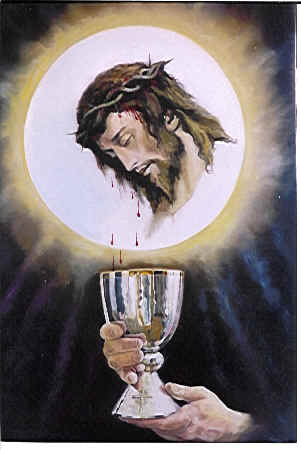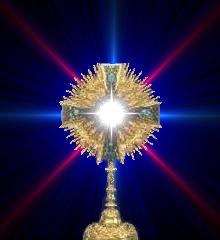|

 

The Sacraments
It is important that you know whether you have Sanctifying Grace in your soul or not. It is something
you cannot afford to be uncertain about. Grace, however, is absolutely spiritual. You cannot feel it or experience
it with any of the five senses. A religious feeling does not indicate that presence of Sanctifying Grace in the soul.
Therefore, Jesus Christ had to give us some signs which would indicate that Grace is going into the soul. He had to
give us signs that we could see, feel, hear or experience with some of the five senses. As a matter of fact, He gave us seven
such signs by which we could know that we are receiving Grace. These signs are the seven Sacraments.
The Sacraments are another indication of how much God loves you and how interested He is in you. In
studying the Sacraments, you will realize keenly how much non-Catholics have missed in life, as the wonders of God's loving
care are unfolded before your eyes.
| ~CLICK ON THIS BANNER BELOW~ |

|
"Sirs, what must I do to be saved?"
They replied, "Believe in the Lord Jesus, and you will be saved--you
and your household."
Acts 16:30-31
Part 1: The Life of a Christian on Earth
From the Gospel of St. John:
Chapter 2: Your Life on Earth: A Wedding Feast! - The Cana Weeding Feast (John 2)
Chapter 3: How to Live this Life: Born Again, by the Holy spirit, by faith (John 3)
Chapter 4: For Whom is this Life: The Samaritan Woman... the Nobleman (John 4)
Chapter 5: Co-redeemers, Mediators.- The cripple man walks (John 5)
Chapter 6: The Sermon of the "Bread of Life", Our Daily Bread (John 6).
Chapter 7: Prophecy of the Holy Spirit: The 7 Pentecost, the 7 Miracles, the 7 Treasures... (John.7)
Chapter 8: What to do when we loose the Life- SIN, the Adulterous Woman (John 8)
Chapter 9: The Hymn of the Word:Jesus is God (John 1)
Chapter 10: The Church of Christ: The Good Shepherd (John 10).
Chapter 11: Death, Resurrection, Eternal Life: The Resurrection of Lazarus (John 11).
Chapter 12: The Messiah, 300 Prophecies: Triumphal entry of Jesus in Jerusalem (John 12)
Chapter 13: The Sermon of the Last Supper: The Washing of the Feet (John 13-17)
~CHECK THIS SITE OUT FOR ALL THE SACRAMENTS~ CLICK HERE
click here
the seven sacrament above is Scott Hahn text,check it out click on The Seven Sacrament.
Frequently Asked Questions
about
SINS AGAINST THE HOLY SPIRIT
Click on the question of your choice to be taken to the answer.
Q. 1. Where do I find in the Holy Bible the reference to blaspheme against the Holy Spirit?
A. Through its Catechism, the Catholic Church teaches that:
"'Whoever blasphemes against the Holy Spirit never has forgivness, but is guilty of an eternal sin.'
[Mk. 3:29; Mt. 12:32; Lk. 12:10] There are no limits to the mercy of God, but anyone who deliberately refuses to accept his
mercy by repenting, rejects the forgiveness of his sins and the salvation offered by the Holy Spirit. [John Paul II, DeV 46]
Such hardness of heart can lead to final impenitence and eternal loss." Return to Table of Contents
Q. 2. More specifically, what sins offend the Holy Spirit?
A. There are six sins that offend the Holy Spirit. These are:
(1) Despair,
"By despair, man ceases to hope for his personal salvation from God, for help in attaining it or for
the forgiveness of his sins. Despair is contrary to God's goodness, to his justice - for the Lord is faithful to his promises
- and to his mercy." (C.C.C. # 2091) (2) Presumption of God's mercy,
"There are two kinds of presumption. Either man presumes upon his own capacities, (hoping to be able
to save himself without help from on high), or he presumes upon God's almighty power or his mercy (hoping to obtain his forgiveness
without conversion and glory without merit)." (C.C.C. # 2092) (3) Impugning the known truth,
(Clarification: To "impugn" the known truth means to attack it by word or argument, to resist it,
to contradict it, or even to oppose the known truth or to challenge it as false.) (4) Envy the spiritual good
of another,
(Clarification: Regarding the gifts of the Holy Spirit, the First Letter of Paul to the Corinthians states,
"All these are activated by one and the same Spirit, who allots to each one individually as the Spirit chooses." To
envy the spiritual good of another is to question the Divine judgment of the Holy Spirit in His distribution of spiritual
gifts. It is to be jealous of another person who has a gift different than one's own gift. Through envy, one rejects the gift
that he has received from the Holy Spirit, determining in his own mind that the gift he has received is not good enough for
him and he wants someone else's gift.) (5) Obstinacy in sin,
(Clarification: To be "obstinate" means to resist the sanctifying power of the Holy Spirit, to be
stubborn, to persist in sin, to be unyielding.) (6) Final impenitence.
(Clarification: "Impenitence" means to be uncontrite, unrepentant, hardened, unconverted, to be without
regret, shame or remorse.) Return to Table of Contents
Q. 3. Where do I find in the Holy Bible the reference to blaspheme against the Holy Spirit?
A. All of the following passages make reference to it:
"Whoever speaks a word against the Son of Man will be forgiven, but whoever speaks against the Holy Spirit
will not be forgiven, either in this age or in the age to come." [Mt. 12:32]
"But whoever blasphemes against the Holy
Spirit can never have forgiveness, but is guilty of an eternal sin." [Mk. 3:29]
"And everyone who speaks a word against
the Son of Man will be forgiven; but whoever blasphemes against the Holy Spirit will not be forgiven." [Lk. 12:10]
WE ARE NOTHING IN OURSELVES Temptation is necessary to us to make us realize that we are nothing in ourselves. St. Augustine
tells us that we should thank God as much for the sins from which He has preserved us as for those which He has had the charity
to forgive us. If we have the misfortune to fall so often into the snares of the Devil, we set ourselves up again too much
on the strength of our own resolutions and promises and too little upon the strength of God. This is very true..~click here~
|

